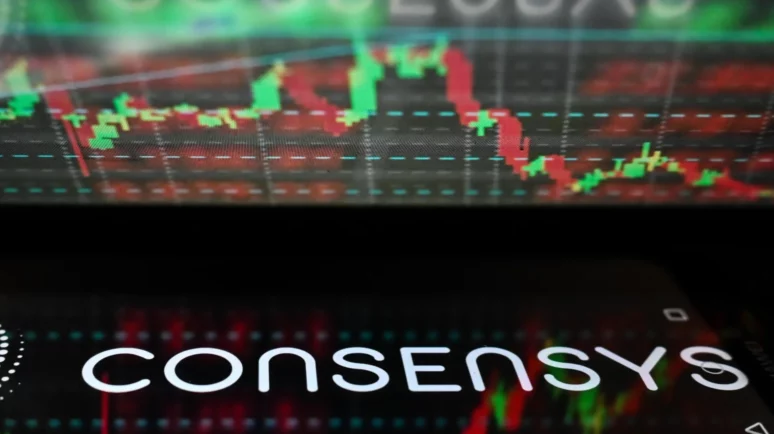Ethereum Could Secure Future in Someone Else’s Court Case as Consensys Sues SEC

Lubin's Consensys Sues SEC Over Ethereum Classification. | Credit: Matt Winkelmeyer/Getty Images for SXSW
Key Takeaways
- Consensys is suing the SEC the agency’s Ethereum regulatory classification.
- Meanwhile, the SEC claims Consensys’ MetaMask wallet is as an unlicensed broker-dealer.
- This lawsuit could set a precedent for how digital assets are classified and regulated in the US.
Consensys has filed a lawsuit against the United Securities and Exchange Commission (SEC), challenging the regulatory classification of Ethereum.
A positive verdict in the Consensys lawsuit could set a judicial precedent. It could potentially ensure a more secure legal environment for Ethereum, despite Vitalik Buterin’s platform not being a party to the case.
Is ETH a Security? Consensys Challenges SEC in Landmark Lawsuit
The legal action follows a Wells Notice from the SEC, which claims that Consensys’s Metamask operates as an “unlicensed broker-dealer”. Consensys has taken legal action against the SEC by filing a complaint in the United States District Court for the Northern District of Texas. The lawsuit aims to challenge the SEC’s classification of Ethereum as a security. Consensys argues that such regulatory measures would significantly hinder technological innovation. They also claim the SEC’s move could adversely affect the American economy.
According to Joe Lubin, co-founder of Ethereum and CEO of Consensys:
“The case we have filed today is intended to preserve access for the thousands of developers, market participants, and institutions who have a stake in the world’s second-largest blockchain.”
Consensys has taken a firm stance against the SEC’s recent regulatory actions, which it views as unjustified and overly aggressive. The company has filed a lawsuit claiming that these actions represent an illegal overreach that could destabilize the Ethereum ecosystem. In its legal challenge, Consensys argues that ETH should be classified as a commodity rather than a security. Therefore, it should not fall under the SEC’s remit. The lawsuit aims to establish that the SEC lacks the legal authority to regulate ETH and Ethereum-based technology.
Can Consensys Stop the SEC?
Lubin expressed concern that unlawful SEC regulations could compromise the vast potential of blockchain technology, hindering the United States’ capacity to pioneer new innovations and technologies using this platform.
The ongoing lawsuit between Consensys and the SEC represents a significant clash in the field of tech regulatory challenges. Should Consensys succeed, it could establish a crucial legal precedent for the classification and regulation of digital assets in the US. Meanwhile, the SEC has issued Consensys with a Wells Notice, accusing its non-custodial wallet, Metamask, of being an unlicensed broker-dealer.
The result of this case could have far-reaching implications for blockchain development around the world. Consensys is actively seeking support from the Ethereum community, providing updates and engagement opportunities through their website. This, in turn, could mobilize broader sectoral support for its stance against the SEC’s actions.
Is Crypto Next? Challenging SEC’s Power Grab in Digital Asset Arena
Consensys has issued a lawsuit, invoking the “major questions doctrine “. This is a legal principle restricting federal agencies from extending their powers beyond the explicit scope granted by Congress.
This approach, however, faces challenges. This is becauae courts have dismissed similar arguments from Terraform Labs and Coinbase. Consensys’s lawsuit aligns with actions by organizations like the Blockchain Association and companies such as Legit Exchange. These groups have also launched preemptive legal challenges to stop the SEC from classifying certain crypto assets as securities.
This legal battle occurs during a broader regulatory crackdown. The SEC has recently launched lawsuits against prominent crypto exchanges such as Binance.US, Binance, and Kraken. Moreover, Uniswap Labs disclosed it had received a Wells Notice, indicating potential SEC action.
While the direct outcomes of Consensys’s lawsuit invoking the “major questions doctrine” are currently focused on the specific legal interpretations and classifications of Ethereum, the implications extend far beyond this one case. A favorable outcome for Consensys could potentially secure a safer future for Ethereum in other legal battles.
Such a precedent would not only benefit Ethereum but could also influence how other digital assets are perceived and regulated. As a result, this could, potentially, reduce legal uncertainties affecting cryptocurrency.


